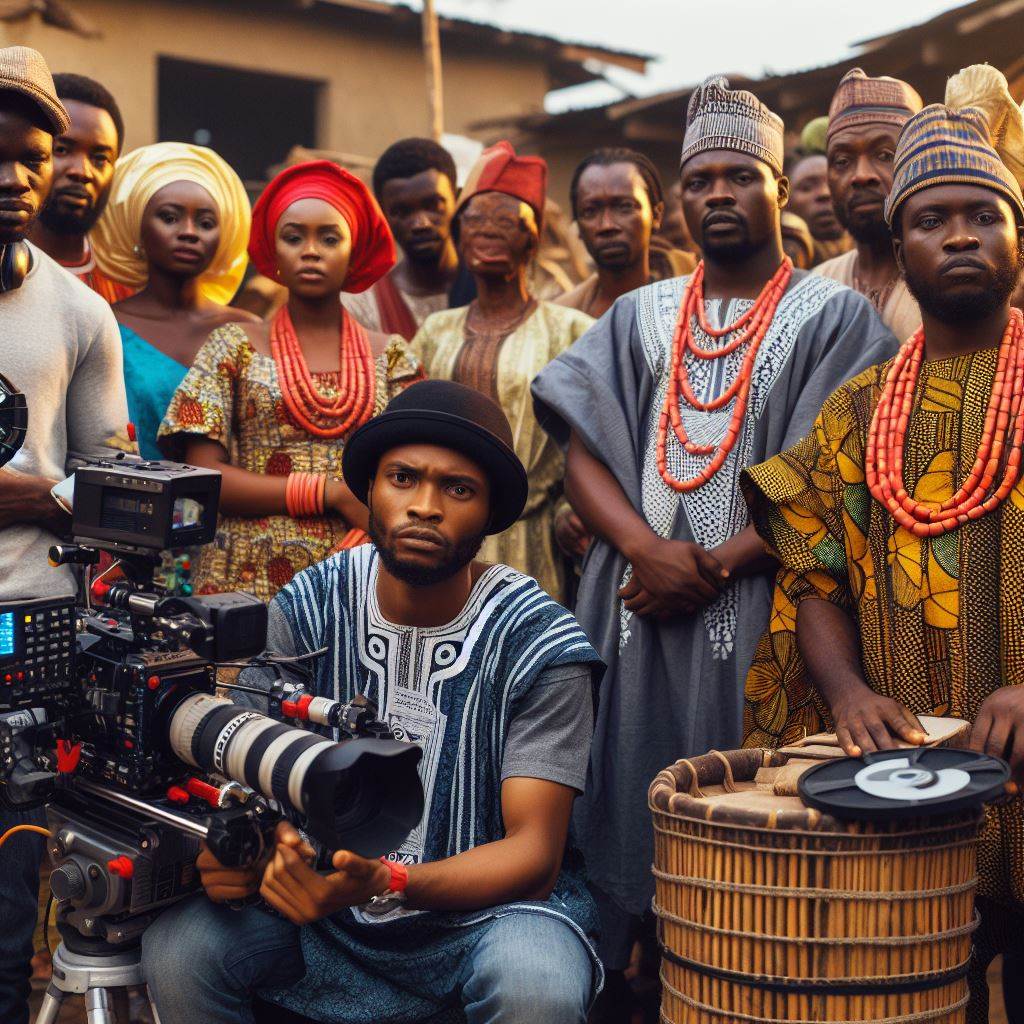Introduction
Aspiring filmmakers in Nigeria have a world of opportunities ahead of them. With the right education and training, they can significantly impact the film industry.
This blog post explores top film schools for Nigerian filmmakers. We will discuss the industry’s brief overview and the importance of film schools. This guide aims to help you choose the best institution for your filmmaking dreams.
Brief Overview of the Nigerian Film Industry
Nollywood is the nickname for Nigeria’s vibrant film industry. It ranks as the second-largest film industry globally.
It produces over 2,500 films annually. Nollywood is famous for its captivating storytelling and unique cultural perspectives. It has significantly contributed to Nigeria’s economy and global cultural influence.
Many aspiring filmmakers in Nigeria dream of making it big in Nollywood. They aim to create films that resonate with local and international audiences.
Importance of Film Schools for Aspiring Filmmakers
Film schools are crucial for budding filmmakers. They provide essential knowledge and practical skills in filmmaking. These schools teach the art and science of film production.
Students learn everything from scriptwriting to directing and editing. They also gain hands-on experience with the latest film equipment and technology.
Film schools also offer networking opportunities with industry professionals.
These connections can be vital for career growth. Attending a film school can give aspiring filmmakers a competitive edge. It prepares them for the challenges of the film industry.
Purpose of the Blog Post
This blog post aims to guide aspiring Nigerian filmmakers. We will highlight top film schools that can nurture their talents. These schools offer comprehensive programs tailored to the needs of the film industry.
By the end of this post, readers will have valuable insights. They will know where to start their journey in filmmaking. This guide will help them make informed decisions about their education and career path.
Choosing the right film school is a crucial step. It can determine the future success of aspiring filmmakers. We hope this post inspires and informs Nigerian filmmakers on their educational journey.
Pursuing a career in film can be challenging but also rewarding. With the right training and determination, the sky is the limit. This blog post is your first step towards making your filmmaking dreams a reality.
In the following sections, we will delve deeper into each recommended film school.
We will explore their programs, facilities, and success stories. Stay tuned for a comprehensive guide to the best film schools for Nigerian filmmakers. Your journey to becoming a successful filmmaker starts here.
Criteria for selecting top film schools
- Accreditation and reputation: Look for schools with a solid accreditation and a good reputation in the film industry.
- Faculty members and industry connections: The quality of instructors and their networks can greatly impact your education.
- Facilities and resources available: Check if the school offers state-of-the-art equipment and ample resources for hands-on training.
- Alumni success stories: Research on the achievements of former students to gauge the effectiveness of the school’s training program.
Top Film Schools for Aspiring Nigerian Filmmakers
When it comes to pursuing a career in filmmaking, choosing the right film school is crucial. As an aspiring Nigerian filmmaker, you want to ensure that you are getting the best education and opportunities to succeed in the industry.
To help you make an informed decision, we have curated a list of top film schools that cater to Nigerian filmmakers based on the criteria mentioned above.
Nigerian Film Institute (NFI)
The Nigerian Film Institute (NFI) is known for its accreditation and reputable film programs. With a dedicated faculty that includes industry professionals, students at NFI have access to valuable industry connections and mentoring.
The institute offers top-notch facilities, including studios, editing suites, and equipment to enhance students’ learning experience.
Notable alumni from NFI have gone on to make significant strides in the Nigerian film industry, solidifying the institute’s reputation for producing successful filmmakers.
Pan-Atlantic University School of Media and Communication
Pan-Atlantic University School of Media and Communication is another excellent choice for aspiring Nigerian filmmakers.
The school boasts a highly experienced faculty with strong industry connections, providing students with access to valuable networking opportunities.
With state-of-the-art facilities and resources, including sound stages and post-production suites, students receive hands-on training that prepares them for real-world filmmaking.
Graduates from Pan-Atlantic University School of Media and Communication have gone on to work on award-winning projects, showcasing the school’s commitment to nurturing successful filmmakers.
Digital Bridge Institute Film Academy
Digital Bridge Institute Film Academy stands out for its industry-focused curriculum and hands-on training.
The academy’s faculty comprises industry professionals who bring their expertise and connections to the classroom, offering students valuable insights and mentorship.
With well-equipped facilities, including soundstages, editing suites, and camera equipment, students get to hone their skills in a professional setting.
Alumni of Digital Bridge Institute Film Academy have achieved success in various roles within the film industry, highlighting the academy’s emphasis on preparing students for successful careers.
In essence, choosing the right film school is essential for aspiring Nigerian filmmakers to kickstart their careers in the industry.
By considering factors such as accreditation, faculty members, facilities, and alumni success stories, you can make an informed decision and select a film school that aligns with your goals and aspirations.
Whether you choose the Nigerian Film Institute, Pan-Atlantic University School of Media and Communication, or Digital Bridge Institute Film Academy, you will receive quality education and valuable industry connections that will set you up for success in the competitive world of filmmaking.
Read: Exploring Semiotics in Communication Arts
Top Film Schools for Aspiring Nigerian Filmmakers
Nigeria’s film industry, often called Nollywood, is thriving. Aspiring filmmakers need top-notch education to succeed. Here are the top film schools in Nigeria.
List of Top Film Schools in Nigeria
National Film Institute (NFI), Jos
The National Film Institute in Jos stands out as Nigeria’s premier film school. Established in 1995, NFI offers a range of programs.
Notable Programs and Specializations
NFI provides courses in directing, cinematography, editing, and scriptwriting. Their emphasis on hands-on training is exceptional. They also offer diploma and degree programs in Film Arts.
PEFTI Film Institute, Lagos
PEFTI Film Institute, founded by Wale Adenuga, is located in Lagos. It has been nurturing filmmakers since 2004.
Notable Programs and Specializations
PEFTI offers certificates and diplomas in various fields. These include film production, acting, scriptwriting, and music. The institute also provides practical training and industry exposure.
Del-York Creative Academy, Lagos
Del-York Creative Academy, based in Lagos, collaborates with international experts. It aims to bring world-class training to Nigeria.
Notable Programs and Specializations
Del-York offers intensive courses in filmmaking, acting, screenwriting, and post-production. Their workshops are led by Hollywood professionals, ensuring high-quality education.
Royal Arts Academy, Lagos
Royal Arts Academy was established by renowned filmmaker Emem Isong. It offers specialized training in the heart of Lagos.
Notable Programs and Specializations
The academy focuses on acting, directing, scriptwriting, and film production. Students gain practical experience through numerous projects.
Lufodo Academy of Performing Arts (LAPA), Lagos
Lufodo Academy of Performing Arts was founded by Nollywood icons Joke Silva and Olu Jacobs. It combines theory and practice effectively.
Notable Programs and Specializations
LAPA offers courses in acting, directing, and stage management. The academy emphasizes holistic training, preparing students for various aspects of filmmaking.
SAE Institute, Lagos
SAE Institute, a global educational network, has a campus in Lagos. It provides industry-relevant training for filmmakers.
Notable Programs and Specializations
SAE offers diplomas and degrees in film production and digital filmmaking. Their curriculum includes hands-on training with state-of-the-art equipment.
Nigerian Film Corporation (NFC) Training School, Lagos
The NFC Training School, under the Nigerian Film Corporation, offers comprehensive film education.
Notable Programs and Specializations
They provide certificate courses in directing, editing, production design, and sound engineering. Their programs are tailored to meet industry standards.
In review, Choosing the right film school is crucial for aspiring Nigerian filmmakers. These top institutions offer a variety of programs and specializations.
Each school provides unique opportunities to develop skills and gain industry experience. Start your filmmaking journey at one of these esteemed schools today.
Read: Developing Critical Thinking in Language Arts
Overview of the Curriculum
Film schools offer diverse curriculums designed to develop a filmmaker’s skills.
The curriculum often includes both theoretical and practical components. Students learn about film history, production techniques, and the business of filmmaking.
Courses cover essential areas like directing, screenwriting, editing, and cinematography.
The curriculum typically starts with foundational courses. These classes ensure students understand the basics of film production and theory. As students progress, they can specialize in their chosen fields.
Film schools emphasize a balanced approach, combining lectures with hands-on projects. This blend helps students apply theoretical knowledge in real-world scenarios.
Common Courses and Subjects
Film schools offer a variety of courses to cover every aspect of filmmaking. Key courses include Film History, Screenwriting, and Directing. These classes provide a strong foundation for any aspiring filmmaker.
Film History covers the evolution of cinema and its global impact. Screenwriting classes teach the art of crafting compelling narratives. Directing courses focus on visual storytelling and working with actors.
Cinematography courses teach students how to capture the perfect shot. Editing classes cover software and techniques for post-production. Production courses offer insight into the logistics of filmmaking, including budgeting and scheduling.
Sound design and film music courses highlight the importance of audio in film. Students also study Film Theory to understand different cinematic approaches and styles.
Elective courses allow students to explore specific interests like animation or documentary filmmaking.
Specialized Tracks or Concentrations
Many film schools offer specialized tracks for focused learning. These concentrations allow students to hone specific skills. Common tracks include Directing, Screenwriting, and Cinematography.
Directing tracks focus on visual storytelling and leadership on set. Students learn how to communicate their vision to the cast and crew. Screenwriting tracks delve deep into the art of scriptwriting.
These courses emphasize story structure, character development, and dialogue.
Cinematography tracks train students in camera operation and lighting. These courses cover both technical skills and artistic vision. Editing tracks teach students how to shape a film in post-production.
This concentration focuses on software skills and narrative pacing.
Some schools offer tracks in Producing, Sound Design, or Animation. Producing tracks cover the business aspects of filmmaking.
Sound Design tracks teach students how to create and edit audio for film. Animation tracks focus on both traditional and digital animation techniques.
Hands-On Experience and Practical Training Opportunities
Hands-on experience is crucial for aspiring filmmakers. Film schools provide practical training through various opportunities. Students often work on film sets to gain real-world experience. These projects help them apply classroom knowledge in practical scenarios.
Transform Your Career with Expert Guidance
Get personalized mentorship consulting that’s tailored to your unique path. Our expert advice is actionable and exclusive.
Get StartedInternships are another valuable component of film education. They allow students to work with industry professionals. This experience is vital for building a network and learning industry standards.
Film schools often have state-of-the-art facilities. These include sound stages, editing labs, and screening rooms. Access to professional equipment helps students learn with industry-standard tools.
Workshops and masterclasses provide additional hands-on training. These sessions are often led by experienced filmmakers.
Participation in film festivals and competitions is encouraged. These events offer students a platform to showcase their work and gain recognition.
In fact, film schools offer comprehensive curriculums designed to equip aspiring Nigerian filmmakers with the skills they need.
Through a mix of theoretical courses, specialized tracks, and practical training, students can develop their talents and prepare for successful careers in the film industry.
Read: Student Experiences: Life in Communication Arts

Student life and extracurricular activities
As an aspiring Nigerian filmmaker, student life at a top film school can be both rigorous and rewarding.
From intensive film production classes to screenings and critiques, you will be immersed in the world of cinema.
Outside of the classroom, film schools often offer various extracurricular activities to enrich your experience.
You may have the opportunity to collaborate with fellow students on independent projects or participate in film festivals.
These activities not only enhance your filmmaking skills but also provide a platform to showcase your work to a wider audience.
Clubs, organizations, and events for aspiring filmmakers
Joining clubs and organizations related to filmmaking can help you network with like-minded individuals and industry professionals.
These groups often host workshops, guest lectures, and networking events that can expand your knowledge and connections in the film industry.
Participating in film-related events, such as festivals and screenings, can also expose you to new ideas and techniques.
Being part of these clubs and organizations can create a sense of community and support among aspiring filmmakers.
These opportunities can help you grow both personally and professionally as you pursue your filmmaking dreams.
Networking opportunities within the film industry
Attending networking events and industry conferences can connect you with established filmmakers, producers, and industry insiders.
These connections can lead to mentorship opportunities, collaborations, and even job offers in the film industry.
Networking within the film industry is crucial for building your career and gaining valuable experience and exposure.
Building relationships with industry professionals can open doors to internships, freelance opportunities, and future projects.
Utilizing these networking opportunities can help you establish yourself as a serious and dedicated filmmaker in the industry.
Internship and job placement assistance
Top film schools often have robust internship and job placement programs to help students gain real-world experience.
These programs can connect you with film production companies, studios, and other industry players for internships.
Interning at a reputable company can provide hands-on experience, mentorship, and potential job opportunities after graduation.
Job placement assistance services can help you secure entry-level positions in the film industry and kickstart your career.
These resources can be invaluable in helping you transition from student filmmaker to professional in the competitive film industry.
Read: Communication Arts: Balancing Theory and Practice
Application Process and Requirements
Applying to film schools in Nigeria involves several steps. Firstly, research the specific school’s admission guidelines. Most schools require an online application form. Fill out this form accurately and honestly.
Additionally, prepare your educational certificates. Schools typically ask for secondary school certificates. Ensure these documents are certified true copies. You may also need a personal statement. This should outline your interest in filmmaking and career goals.
Furthermore, create a portfolio of your work. This might include short films, scripts, or other creative projects. Submitting this portfolio showcases your talent and commitment.
Finally, be prepared for an interview. Many schools conduct interviews to assess your passion and suitability. Practice articulating your creative vision and experiences confidently.
Admission Criteria for Film Schools in Nigeria
Film schools in Nigeria have specific admission criteria. A strong academic background is essential. Most institutions require at least five credits in relevant subjects, including English and Literature.
Additionally, creative experience is highly valued. Schools prefer applicants with a demonstrated interest in filmmaking. This could be through previous work or relevant courses.
Furthermore, some schools require aptitude tests. These tests assess your creative and analytical abilities. Prepare for these tests by reviewing filmmaking concepts and practices.
Personal statements are also crucial. They should reflect your passion for filmmaking and long-term aspirations. Admissions committees look for genuine enthusiasm and clear goals.
Lastly, letters of recommendation can boost your application. Choose references who can speak to your creative abilities and dedication.
Application Deadlines and Materials Needed
Pay close attention to application deadlines. Each film school has its own timeline. Generally, deadlines fall between December and March for the upcoming academic year.
Submit your application form early. Late submissions are often not considered. Collect all required materials well in advance. These typically include academic transcripts, a personal statement, and a portfolio.
Prepare digital copies of your work. Most schools prefer online submissions. Ensure your portfolio is well-organized and accessible.
Additionally, prepare for any required tests or interviews. Schedule these early to avoid last-minute stress. Keep track of all deadlines using a calendar or planner.
Scholarships and Financial Aid Options Available
Financing film school can be challenging, but several options exist. Many Nigerian film schools offer scholarships. These are often merit-based, rewarding academic and creative excellence.
Additionally, some schools provide need-based financial aid. This helps students from low-income backgrounds. To apply, submit a detailed financial statement. Demonstrating financial need can increase your chances of receiving aid.
External scholarships are also available. Organizations such as the Nigerian Film Corporation offer funding. Research these opportunities thoroughly. Each scholarship has specific eligibility criteria and deadlines.
Furthermore, consider applying for international scholarships. Some global institutions offer support to aspiring filmmakers. These can cover tuition, living expenses, and travel costs.
Lastly, part-time work can help finance your studies. Many film schools offer work-study programs. These allow students to work on campus while studying. Balancing work and study requires good time management skills.
By understanding these processes and requirements, aspiring Nigerian filmmakers can successfully navigate film school applications.
Conclusion
The journey to becoming a successful filmmaker starts with the right education. Aspiring Nigerian filmmakers have a range of excellent film schools to consider.
These institutions provide the skills, knowledge, and networks necessary to succeed in the competitive film industry.
Recap of the Top Film Schools for Aspiring Nigerian Filmmakers
National Film Institute (NFI), Jos
The National Film Institute in Jos offers comprehensive training in filmmaking. It covers various aspects such as directing, scriptwriting, and production. The institute boasts experienced faculty and state-of-the-art facilities.
Lagos Film School
Lagos Film School is renowned for its practical approach to film education. It focuses on hands-on training and industry exposure. Students graduate with real-world experience and a robust portfolio.
PEFTI Film Institute
PEFTI Film Institute, established by the Wale Adenuga Productions, provides a diverse curriculum. It includes courses in acting, directing, and cinematography. PEFTI emphasizes creativity and technical proficiency.
New York Film Academy (NYFA)
For those considering international options, the New York Film Academy offers extensive programs. NYFA is known for its intensive workshops and global perspective. It provides a platform for Nigerian students to gain international exposure.
London Film School (LFS)
London Film School is another excellent international choice. It offers a collaborative environment and access to a vibrant film community. LFS programs focus on storytelling, technical skills, and creative development.
Encouragement for Pursuing a Career in Filmmaking
Pursuing a career in filmmaking can be incredibly rewarding. The film industry offers numerous opportunities for creativity and innovation. Nigerian filmmakers have a unique voice and perspective to share with the world.
The skills acquired in film school extend beyond filmmaking. Graduates develop critical thinking, project management, and communication skills. These abilities are valuable in many career paths.
The global film industry is continuously growing. There is a constant demand for fresh stories and diverse perspectives. Nigerian filmmakers can contribute significantly to this dynamic industry.
Call to Action
If you are passionate about filmmaking, now is the time to take action. Research the film schools mentioned and explore their programs. Determine which school aligns best with your goals and interests.
Applying to film school is a significant step towards a successful career. Prepare your application carefully, showcasing your creativity and dedication. Seek advice from current students or alumni to enhance your application.
Do not hesitate to pursue your dream. The world of filmmaking is waiting for your unique stories and vision. Take the first step by exploring your options and applying to a film school today.
Invest in your future and make your mark in the film industry. Your journey as a filmmaker begins with the right education and training. Embrace this opportunity and start your path to becoming a renowned filmmaker.




